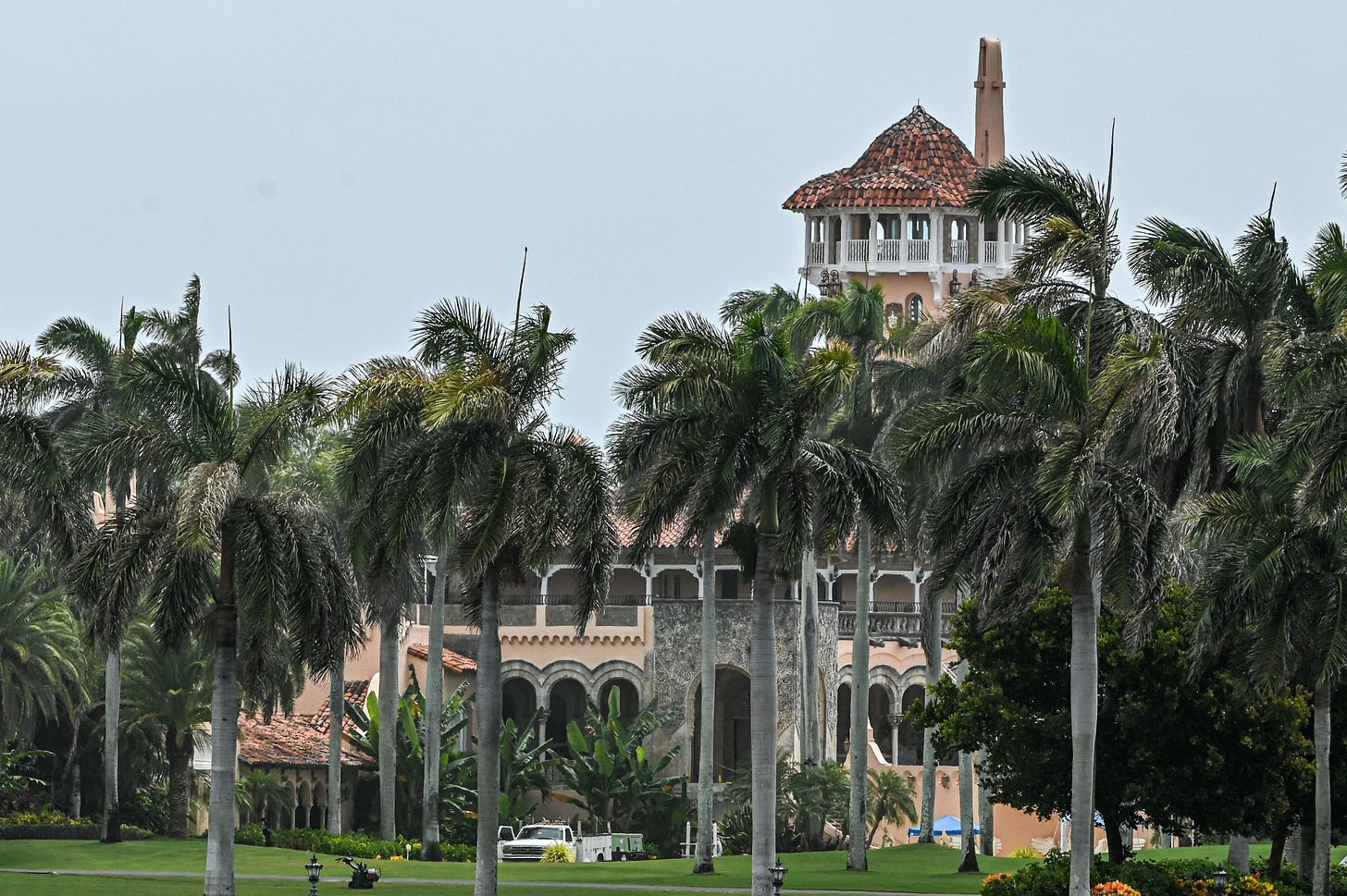Trump’s Mess at Mar-a-Lago
If Trump committed a serious crime, he must be prosecuted. But the law alone won’t be enough to save American democracy.

Editor’s Note: This piece was published before the unsealing on August 12th of the warrant and inventory related to the FBI’s search of Mar-a-Lago.
The FBI's search of Donald Trump's Mar-a-Lago estate earlier this week has intensified partisan conflict, speeding us towards the 2024 election cycle even before midterms are held. Will there be a criminal prosecution of the former president? Should there be? And how will the answers to these questions affect our deeply polarized politics?
It is too early to know the legal significance of the search itself. We do not know for sure the crime or crimes for which probable cause was found—a necessary step for a federal judge to authorize the search warrant. (We may soon learn more if the Department of Justice releases the search warrant.) What we do know is that the search was apparently connected with an ongoing dispute with the National Archive over materials, some classified, that Trump took with him when he left the White House. This may implicate him under a number of federal statutes that govern the handling of public documents, including the Presidential Records Act, which criminalizes misuse or destruction of presidential records. We do not know whether the documents sought and seized in the search had any connection to the larger conspiracy crimes alleged by the January 6 Committee, namely to defraud the United States and obstruct an official proceeding. And of course, there is no way of knowing whether the evidence will lead to an eventual prosecution.
Assuming that there is evidence of a crime, is prosecuting Trump a good idea? Caution is in order. Getting a criminal conviction requires proof of intent beyond a reasonable doubt, and these documents may shed some light on that question. Without smoking gun proof of intent, though, a prosecution would be a disaster. Even a successful prosecution will not convince most Trump supporters of his guilt, and a failed one will have grave consequences for the rule of law, and potentially for our deeply strained democracy.
The decision to prosecute is obviously a weighty one. On the one hand, the rule of law requires that no person should be above the law, not even a former president. On the other hand, democracies can only function if leaders do not regularly go after their predecessors as a matter of course. Such routine prosecutions would raise the stakes of political competition too high: if losing an election means potential jail time, incumbents would be unlikely to ever give up power. This is why democracies tend to forgive former leaders for misdeeds—Ford pardoned Nixon and the country moved on.
That said, most of the situations in which democracies have chosen to forgive occur after the behavior in question has been repudiated: the war has been lost or the president is completely out of power. That is certainly not the case here, where the target of the investigation is the de facto leader of the Republican Party, leaving open the question of how high the bar should be for prosecution. One can argue, of course, that Trump's criminal behavior was so exceptional that prosecution is warranted. Given the threat he posed (and still poses) to democracy, perhaps it is necessary to hold him accountable.
Whatever the Justice Department decides to do, the law alone will be insufficient to rescue our democracy from its malaise. Legal accountability for wrongdoing is neither necessary nor sufficient for political accountability, and the latter can only come with a loss at the polls. The election itself is the verdict. Here is where prosecution has the potential to backfire. After the search, the Republican Party predictably circled the wagons nearly as quickly as Trump sought to monetize the event with a fundraising appeal. This dynamic will continue and intensify in the event of an eventual prosecution.
At this point, we simply have too little information to know whether the search was a good idea or not. The Department of Justice does seem to be proceeding methodically—a reassuring sign. But even if we get the most competent prosecution of the century, the consequences are unpredictable, and we will not resolve our nation’s underlying problems of polarization and partisan tribalism.
Tom Ginsburg is the Leo Spitz Professor of International Law at the University of Chicago.
Follow Persuasion on Twitter, LinkedIn, and YouTube to keep up with our latest articles, podcasts, and events, as well as updates from excellent writers across our network.



I am sorry, but I am so tired of the "save democracy", "threat of democracy" canard with respect to Trump that I simply cannot take the writer seriously. It is an intellectually bankrupt meme that has been repeated so many times that it has lost its meaning even if it had been based on anything real... which it had never been.
The only real threat to democracy that we have experienced has been from the left administrative authoritarians throughout the pandemic. As these power-hungry talent-less politicians and bureaucrats have drunkenly granted themselves emergency powers, they then went to work abusing those emergency powers to their maximum potential... deleting any and all voices of the people that might oppose as their families, children and businesses were irreparably and unnecessarily harmed.
I remember, when George W. Bush was coming into office, someone arguing that he should pardon Bill Clinton for the sake of national healing. Ah, to go back to those innocent times, when lying about sex in the Oval Office was what people got angry at the President for.